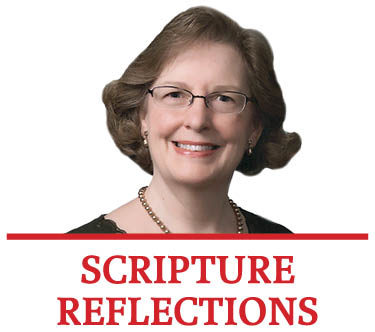Scripture Readings, Oct. 15, 2023
Oct. 15, 2023
Twenty-Eighth Sunday in Ordinary Time
Isaiah 25:6-10
Psalm 23: 1-3a, 3b-4, 5, 6 (5cd)
Philippians 4:12-14, 19-20
Matthew 22: 1-14
Our granddaughter traveled to Portugal for World Youth Day in late July. She went with a group of consecrated virgins from Washington, D.C., and came back with wild stories of unbelievable crowds (they took four hours to travel on foot a 30-minute distance through the density of humanity holding onto each other’s backpacks while snaking their way to an open area to hear Pope Francis speak). The heat index reached almost 110 degrees at times, but the 1.5 million young people gave evidence to the fact that God is alive, the Spirit is flourishing and the beckoning of God’s call is loud.
She rejoiced at the authentic pilgrimage event, but there was one great highlight for her.
Amid it all, Bishop Robert Barron spoke to the young people in a church garmented with all the grandeur of art of the Middle Ages. “Have you looked at this church?” he asked them, pointing to the ceiling where Christ is flanked by angels and the Holy Spirit is radiant, drawing the faithful to the heavens. Barron warned that when truth is difficult to identify and the good is co-opted, then showing people Catholic beauty can take the soul to a place where truth and good can break through. But that was not the heart of Barron’s talk. He spoke about the wedding feast at Cana and asked the provocative question: “Why did Jesus have to go to a wedding?” In Barron style, whatever he asks, he answers.
“What the Church Fathers tell us is that Christ, himself, in his very person is the marriage of heaven and earth. In Christ, there is a marriage between divinity and humanity … therefore, Jesus, who is the marriage of heaven and earth, is at a wedding.”
Matthew knew that. Matthew created a parable for the chief priests and the elders about a wedding. Why was that important? Because these chief priests and elders of the people would have been very familiar with the passage from Isaiah which says, “As a young man marries a young woman, so will your builder marry you. As a bridegroom rejoices over his bride, so will your God rejoice over you.” (Matthew 62:5) These leaders of the Church of Jerusalem were precious to God, and God was excited to share with them the reality of salvation in his son, Jesus Christ.
The parable is bait.
Let’s take a closer look. There is a king who has a son whose wedding is imminent. He invites his favored guests, but they are disinterested.
Weddings in the days of Jesus were highly celebrated events lasting for days. To decline the invitation was to dishonor the king. It is a very important invitation, and a tragic rejection.
Why? The parable is about God who is inviting the guests to the marriage of his Son. Who is the bridegroom? It is Jesus. Who is the bride? It is us — you and me. The divine mystical wedding is about our coming into sacred union with the living God in Christ Jesus.
But the invited guests refuse. They are out of touch and the pleading of the king to come to the feast of love is rejected. In fact, it brings violence.
So, the king bids his messengers to go out onto the highways to find all people, not just the elect, but all of humanity. They come. The marriage is not futile but accomplishes God’s purposes. However, there is a requirement. The guests must wear a wedding garment.
What is that about? If indeed the people are invited from the streets, then why would one expect them to be donned in a wedding garment? Because the parable is about relationship. The guests are not invited to observe the wedding, but to participate in the relationship of divine intimacy. The king is not lost to drinking and revelry, but notices one who is not eager to share in the relationship. “Friend,” he says, “how is it that you came here without a wedding garment?” In a sense he was saying “you have no desire, no longing, no wish to live in relationship with the Son.” Therefore, he does not belong and is thrown out into the darkness.
When the heart is not disposed to the love and gift the marriage to Christ offers, there can be nothing but darkness. The binding of the hands and feet, where there could have been dancing and song, the casting out into darkness, where there could have been the celebration of joy, the weeping and gnashing of teeth, where there could have been laughter, are wrapped up in human choices. The king proclaims that many are called, but few are chosen, or perhaps, few make the choice to come.
Matthew’s community was in stark contrast to the Roman Empire. Against the backdrop of civil oppression, Matthew’s community lived in households where poverty of spirit prevailed. They were a people whose mourning turned to joy, whose eagerness for righteousness turned to fulfillment. They were a community of mercy, peacemaking and purity of heart. Theirs was the wedding feast that those on the outside could never really understand.
The million plus young people who stood in the rain to have their confessions heard, who waited in the heat, praying rosaries in groups, sleeping on the ground, and who lived out of a backpack for days and weeks, knew the joy of the wedding feast. Let us hope they returned home to invite others to come, too.

